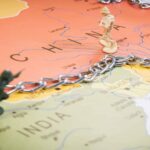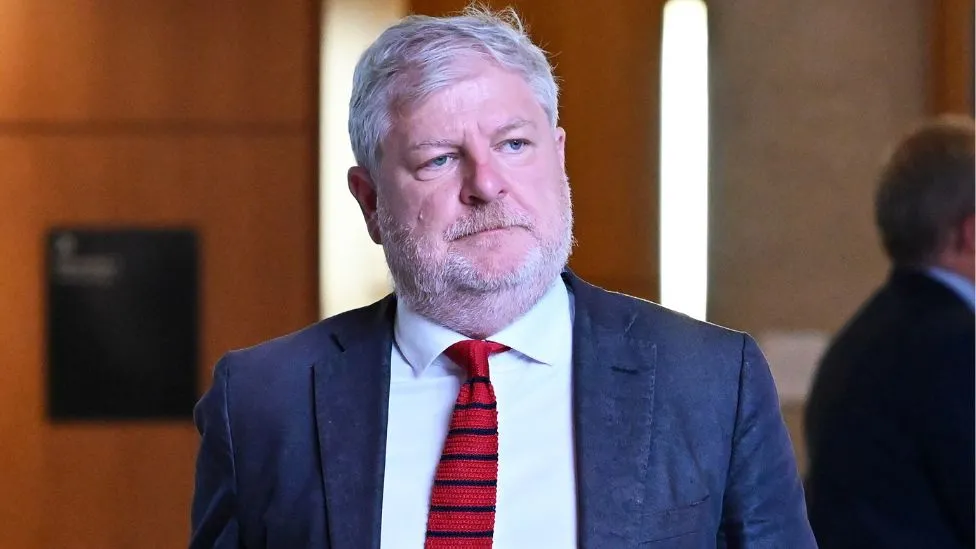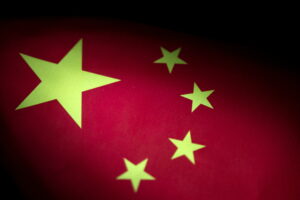An SNP MP has said he is “dismayed” at a Scottish government minister’s trip to China.
External Affairs Secretary Angus Robertson is visiting several Chinese cities this week.
A press release announcing the trip made no mention of human rights or security issues related to China.
The Scottish government said the country had a “a long history of intellectual, cultural and economic exchange with China.”
But MP Stewart McDonald, who previously sat alongside Angus Robertson on the SNP benches at Westminster, warned that the “character and tone” of the visit was “out of step with international opinion.”
The Glasgow MP stressed that he believed China represented Scotland’s biggest security threat.
Mr McDonald said: “China is no ordinary trading partner. It has violently cracked down on democracy and the rule of law in Hong Kong, is carrying out a genocide against Uighur Muslims, is increasingly threatening the people of Taiwan.”
The trip was also criticised by the head of Westminster’s foreign affairs committee and an international cross-party group of politicians.
The focus of Mr Robertson’s trip includes promoting business and tourism.
He is scheduled to meet representatives of the Beijing government, as well as business leaders and alumni from Scottish universities.
In a statement, the external affairs secretary said: “I look forward to visiting Beijing, Kunming and Shanghai and promoting Scotland as an open, connected and outward-looking country.”
He added that he hoped to “meet key stakeholders on energy and green transition” and would be signing a memorandum of understanding on culture and tourism.
The Scottish government is keen to strengthen economic links with China.
A quarter of international students in Scottish higher education are from China, and key exports to the country include whisky and salmon.
But more questions have been raised in recent years regarding China’s treatment of some of its own citizens, and its longer-term strategic ambitions.
Last year, the UN accused China of “serious human rights violations” in a report into allegations of abuse in Xinjiang province, where about 12 million Muslim Uyghurs live.
China denies all allegations of human rights abuses in Xinjiang.
This week the campaign group Human Rights Watch alleged there was a “systematic effort” to curb the practice of Islam in the country.
The security services have also recently warned about Chinese infiltration in UK politics.
In September, a researcher at the UK Parliament was arrested under the Official Secrets Act, amid claims he was spying for China. The researcher has said he is “completely innocent”.
A recent report by Parliament’s intelligence and security committee said the Beijing government sought the “monitoring and controlling” of Chinese students in the UK.
Coercion claim
Alicia Kearns, who chairs Westminster’s foreign affairs committee, questioned the trip’s focus on encouraging more Chinese students to study in Scotland.
She told BBC Scotland News: “Chinese students in the UK live in constant fear of CCP (Chinese Communist Party) surveillance and intimidation. I have long called for greater protections for Chinese students and their research against coercion from Beijing.
“While dialogue with China is important I urge the Scottish external affairs minister to be clear-eyed on the reality of Chinese influence in Scottish education and any purported goodwill from Beijing.”
The Independent Parliamentary Alliance on China (IPAC), a group of legislators that has concerns about human rights, questioned the Scottish government’s “uncritical approach” towards Beijing.
Three SNP MPs – Stewart McDonald, Alyn Smith and Chris Law – are members of IPAC.
Luke de Pulford, the group’s executive director, said: “It isn’t just Uyghurs and Hong Kongers who are let down. It’s the people of Scotland who deserve to be protected from exposure to Xi Jinping’s dictatorship.”
The UK government has also faced criticism for not taking a more critical stance on China.
Ministers recently said that isolating Beijing would be against the UK’s national interest.
The new foreign secretary, Lord David Cameron, previously tried to form closer links when he was prime minister, including a 2016 trip to a village pub with President Xi Jinping.
A Scottish government spokesperson said: “The Scottish government’s position on China is resolute and in keeping with the values of Scotland.
“Like the UK government, the Scottish government considers that China’s global importance and impact means it is essential we maintain economic, political, cultural, educational and social relationships with the people of China and work together on global priorities such as tackling climate change and biodiversity loss.
“China is a priority market for Scottish exports and we have strong academic and research links in higher education.
“A positive trade and investment relationship is mutually beneficial, where consistent with our values and overall national security, and helps people and businesses to connect through education, research and cultural links.”
Source : BBC
















Add Comment